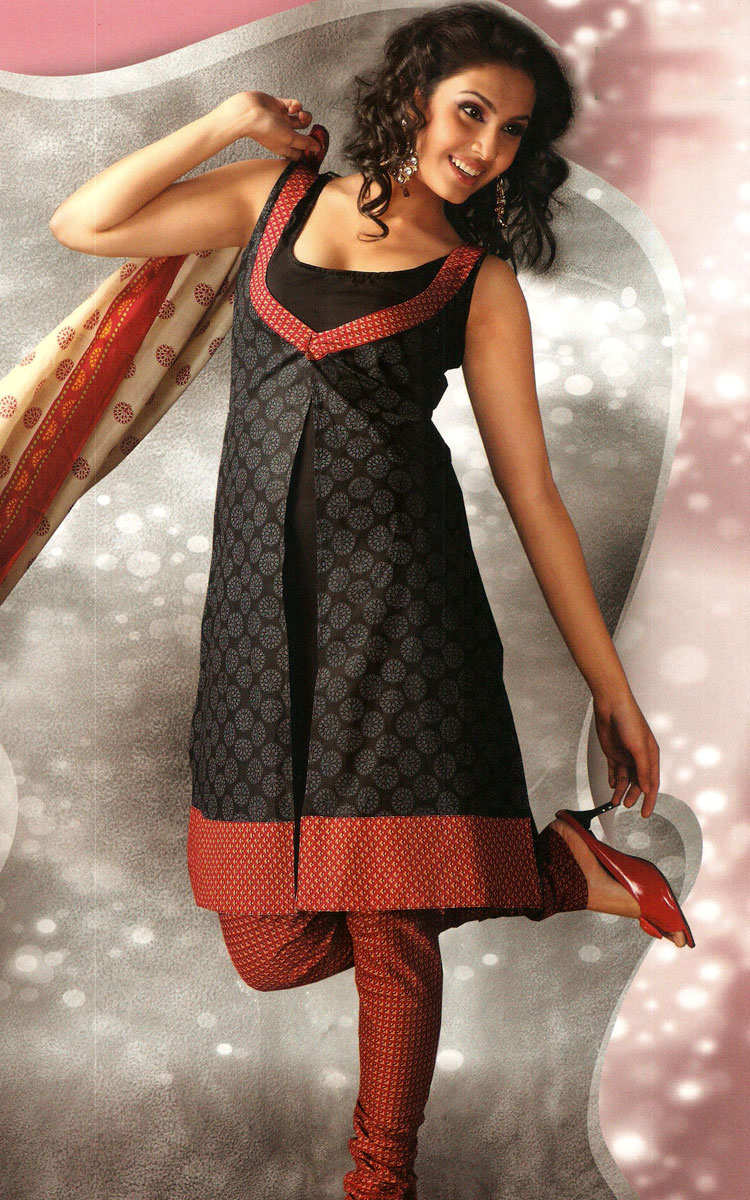Churidar Kurta Designs Biography
Source(Google.com.pk)Among those discerning women who select their clothes with passion, designer churidars are an inevitable way of life. In modern day India, a woman purchasing power has increased many times. Sometimes she is born in an opulent family, or she might have a working mother in a high profile job or she might herself be a successful professional. They form one of the consumer sections. These women are not satisfied with bollywood outfits or normal salwar kameez . They are more social than others and have enough peer pressure to opt for designer churidars .
There are many names including Manish Malhotra, Satya Paul and many others who have carved a niche for themselves in the Indian fashion scene and international fashion. They have understood their female clients clearly and blended textures to exude moods of their customers. Since designer churidars relates to prestige issue in terms of originality, the designers take great pains to blend creativity to practical applications. While normal salwar kameez is cheap and used anywhere, one buys designer churidars for a fortune and uses it only for high profile occasions.
designer churidars are available in all materials. During weddings, the women belonging to the families of the bridal couple opt for designer churidars . Fashion technology is an evolving science in India with a growing number of students. Since enjoying life has becoming the mantra of the day for hard working individuals, the apparel industry is geared up to meet the increasing demands. There are talent search held by fashion schools and televisions to find the best and recruit them.
The term Pakistani clothing refers to the ethnic clothing that is typically worn by individuals in the country of Pakistan and by the People of Pakistani descent. Pakistani clothes express the Culture of Pakistan, the Demographics of Pakistan and regional Cultures which include Punjabi culture, Sindhi culture, Balochi culture, Pashtun culture and Kashmiri culture. Dress in each regional culture reflect weather conditions, way of living and distinctive style which gives it a unique identity among all cultures.Pakistani dressing has similarities with Indian dressing because of pre-partition culture which was shared by these nations for thousand years but the religious factor was always there which makes a difference. Traditional Pakistani dressing also shares similarities between the ethnic groups of central Asia and ethnicities of the Iranian plateau such as the Turkic ethnic groups (i.e. Khazakhs, Uzbeks, Turkmens) and Iranic ethnic groups (Tajiks, Khorasani Persians and Pashtoons), that have been separate from the cultures of modern day Pakistan during the Durand agreement between Afghanistan and the British raj.With the passage of time Pakistanis are adapting modern dress and cultural clothing, especially in big countries.Pakistani man and a child wearing shalwar kameez.The shalwar kameez is the national dress of Pakistan and is worn by men and women in all four provinces Punjab, Sindh, Baluchistan, Khyber Pakhtoonkhwa and FATA in the country and in Azad Kashmir. Each province has its own style of wearing the Shalwar.The churidar is usually worn with a kameez (tunic) by women or a kurta (a loose overshirt) by men, or they can form part of a bodice and skirt ensemble, as seen in the illustration of 19th century Indian women wearing churidar with a bodice and a transparent overskirt.
Kashmiri children." Full-length studio portrait of a young Kashmiri boy and girl, in the modern-day state of Jammu and Kashmir, taken by an unknown photographer in the 1890s. These elegantly dressed children are wearing clothing embroidered with intricate traditional patterns which are said to have been inspired by the beauty of the flora and fauna of Kashmir. This beautiful area on the northern borders of India and Pakistan is famous for its woollen textiles, fine shawls and carpets which are still produced using traditional methods going back centuries.
Churidar Kurta Designs Images Pictures Photos Designs Style 2013

Churidar Kurta Designs Images Pictures Photos Designs Style 2013

Churidar Kurta Designs Images Pictures Photos Designs Style 2013

Churidar Kurta Designs Images Pictures Photos Designs Style 2013

Churidar Kurta Designs Images Pictures Photos Designs Style 2013

Churidar Kurta Designs Images Pictures Photos Designs Style 2013

Churidar Kurta Designs Images Pictures Photos Designs Style 2013

Churidar Kurta Designs Images Pictures Photos Designs Style 2013

Churidar Kurta Designs Images Pictures Photos Designs Style 2013

Churidar Kurta Designs Images Pictures Photos Designs Style 2013

Churidar Kurta Designs Images Pictures Photos Designs Style 2013

Churidar Kurta Designs Images Pictures Photos Designs Style 2013

Churidar Kurta Designs Images Pictures Photos Designs Style 2013

Churidar Kurta Designs Images Pictures Photos Designs Style 2013

No comments:
Post a Comment